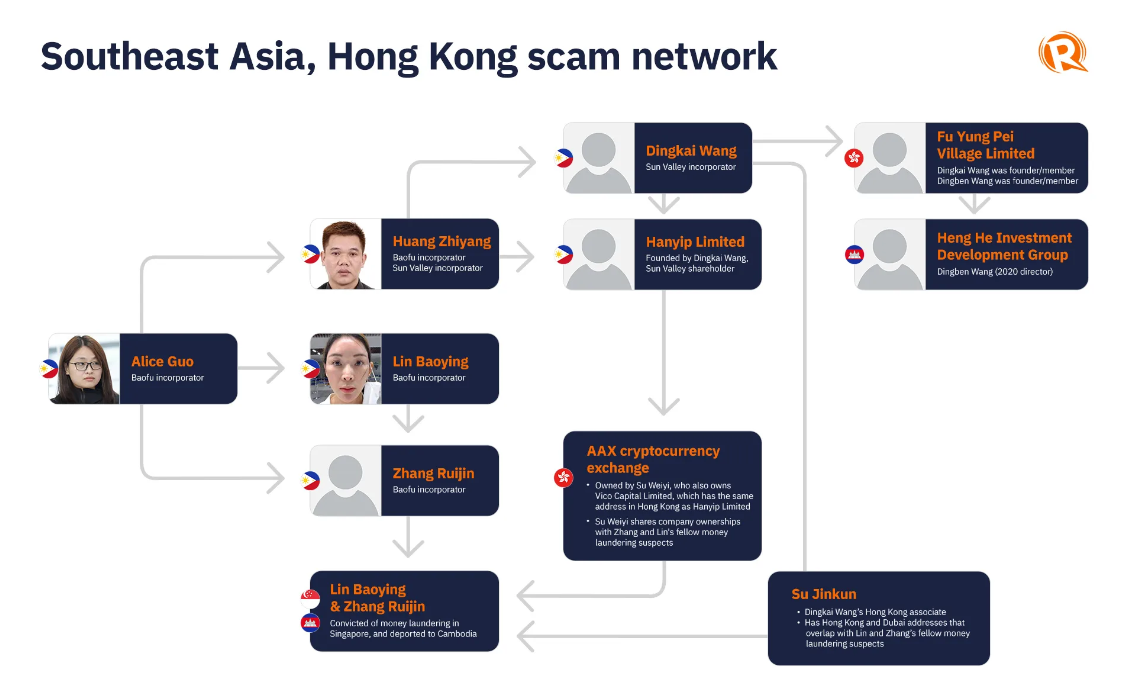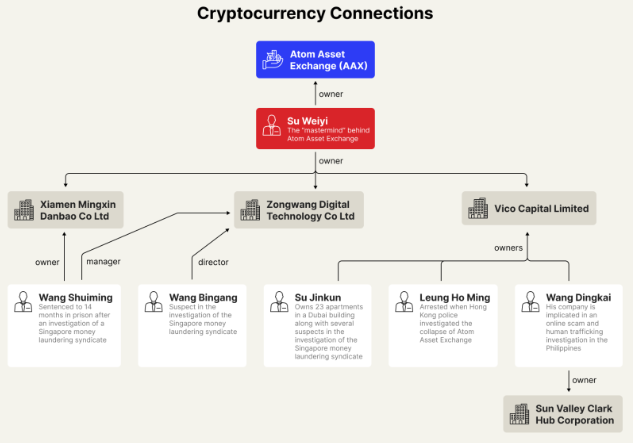Disgraced former Philippine mayor Alice Guo has been linked to defunct Atom Asset Exchange (AAX), which laundered and stole customers’ crypto assets in 2022, amid a shocking trial of human trafficking and fraud that has captured the nation.
Guo made headlines in March for her ties to a financial slavery ring operating just 100 meters from her mayoral office in Bamban, a small town north of Manila. Investigators found almost 1,000 workers on the property, mostly running an illegal gambling operation that catered to Chinese clients. Some of the workers had been human trafficked and forced into conducting pig-butchering scams.
Baofu, the 20-acre compound housing the operation, was once 50% owned by Alice Guo. Investigators raiding Baofu found a car registered in her name, and three escape tunnels that led to an empty lot owned by Guo. An electricity bill in her name was also discovered.
Read more: Thousands enslaved in Cambodia to run fake ICOs and scams
This revelation led investigators to find anomalies in her documents suggesting that Guo had forged her Philippine heritage. Alice Guo’s fingerprints matched a Chinese citizen, raising concerns that she may be a Chinese spy.
“Is this mayor […] a Chinese spy? A big-time launderer? An enabler of scams and human trafficking? None of the above, one of the above or all of the above?” questioned Senator Risa Hontiveros at a hearing (via The Guardian).
Alice Guo’s business partners linked to AAX crypto exchange
Baofu’s co-incorporator, Huang Zhiyang, was a shareholder in another fraudulent business in the Philippines called Sun Valley Clark Hub Corporation. The firm owned several commercial and residential properties that housed a human trafficking ring that similarly forced victims into running crypto scams.
Rappler’s investigation found that Sun Valley’s shareholder, Hanyip Limited, was founded by Wang Dingkai. Hanyip’s listed address in Hong Kong is the same as Vico Capital Limited, owned by Chinese national Su Weiyi.

According to Hong Kong police, Su is also the “mastermind” of AAX cryptocurrency exchange, a now-defunct operation that once had over 2 million users. He’s accused of taking off with at least $2.15 million in customers’ crypto — but a petition alleges that figure is at least $30 million.
Su Weiyi co-owns other companies with partners tied to convicted felons Lin Baoying and Zhang Ruijin, who made international headlines last year for running Singapore’s largest money laundering ring. This connection has raised concerns that AAX, formerly one of Hong Kong’s largest crypto exchanges, was also laundering funds.
Zhang Ruijin was also an incorporator of Baofu together with Alice Guo and Huang Zhiyang.

Read more: India disconnects 20M phone numbers in ‘cyberslave’ crackdown
This intricate network of money laundering, human trafficking, and cryptocurrency scams is just one alarming case in South East Asia, where such organized crime is rapidly rising. In the Philippines, Alice Guo’s case has raised concerns of Chinese interference, where disputed territory in the South China Sea has escalated tensions between the two nations.
Guo faces 87 counts of money laundering and complaints of operating an illegal gambling ring and human trafficking. She and her accomplices could face up to 1,218 years in prison if found guilty.
Guo has denied all charges.
Disgraced former Philippine mayor Alice Guo has been linked to defunct Atom Asset Exchange (AAX), which laundered and stole customers’ crypto assets in 2022, amid a shocking trial of human trafficking and fraud that has captured the nation.
Guo made headlines in March for her ties to a financial slavery ring operating just 100 meters from her mayoral office in Bamban, a small town north of Manila. Investigators found almost 1,000 workers on the property, mostly running an illegal gambling operation that catered to Chinese clients. Some of the workers had been human trafficked and forced into conducting pig-butchering scams.
Baofu, the 20-acre compound housing the operation, was once 50% owned by Alice Guo. Investigators raiding Baofu found a car registered in her name, and three escape tunnels that led to an empty lot owned by Guo. An electricity bill in her name was also discovered.
Read more: Thousands enslaved in Cambodia to run fake ICOs and scams
This revelation led investigators to find anomalies in her documents suggesting that Guo had forged her Philippine heritage. Alice Guo’s fingerprints matched a Chinese citizen, raising concerns that she may be a Chinese spy.
“Is this mayor […] a Chinese spy? A big-time launderer? An enabler of scams and human trafficking? None of the above, one of the above or all of the above?” questioned Senator Risa Hontiveros at a hearing (via The Guardian).
Alice Guo’s business partners linked to AAX crypto exchange
Baofu’s co-incorporator, Huang Zhiyang, was a shareholder in another fraudulent business in the Philippines called Sun Valley Clark Hub Corporation. The firm owned several commercial and residential properties that housed a human trafficking ring that similarly forced victims into running crypto scams.
Rappler’s investigation found that Sun Valley’s shareholder, Hanyip Limited, was founded by Wang Dingkai. Hanyip’s listed address in Hong Kong is the same as Vico Capital Limited, owned by Chinese national Su Weiyi.

According to Hong Kong police, Su is also the “mastermind” of AAX cryptocurrency exchange, a now-defunct operation that once had over 2 million users. He’s accused of taking off with at least $2.15 million in customers’ crypto — but a petition alleges that figure is at least $30 million.
Su Weiyi co-owns other companies with partners tied to convicted felons Lin Baoying and Zhang Ruijin, who made international headlines last year for running Singapore’s largest money laundering ring. This connection has raised concerns that AAX, formerly one of Hong Kong’s largest crypto exchanges, was also laundering funds.
Zhang Ruijin was also an incorporator of Baofu together with Alice Guo and Huang Zhiyang.

Read more: India disconnects 20M phone numbers in ‘cyberslave’ crackdown
This intricate network of money laundering, human trafficking, and cryptocurrency scams is just one alarming case in South East Asia, where such organized crime is rapidly rising. In the Philippines, Alice Guo’s case has raised concerns of Chinese interference, where disputed territory in the South China Sea has escalated tensions between the two nations.
Guo faces 87 counts of money laundering and complaints of operating an illegal gambling ring and human trafficking. She and her accomplices could face up to 1,218 years in prison if found guilty.
Guo has denied all charges.





